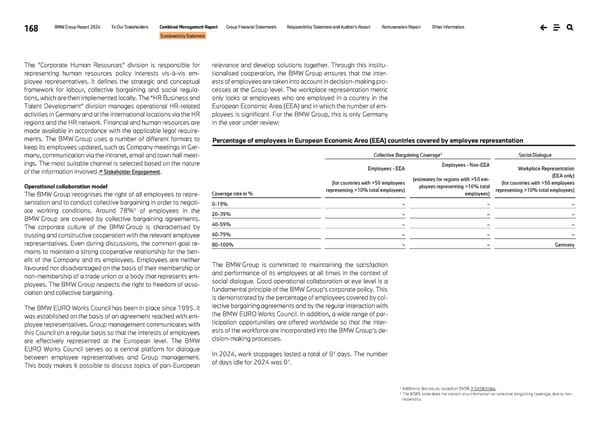168 BMW Group Report 2024 To Our Stakeholders Combined Management Report Group Financial Statements Responsibility Statement and Auditor’s Report Remuneration Report Other Information Sustainability Statement The ”Corporate Human Resources” division is responsible for representing human resources policy interests vis-à-vis em- ployee representatives. It defines the strategic and conceptual framework for labour, collective bargaining and social regula- tions, which are then implemented locally. The “HR Business and Talent Development” division manages operational HR-related activities in Germany and at the international locations via the HR regions and the HR network. Financial and human resources are made available in accordance with the applicable legal require- ments. The BMW Group uses a number of different formats to keep its employees updated, such as Company meetings in Ger- many, communication via the intranet, email and town hall meet- ings. The most suitable channel is selected based on the nature of the information involved ↗ Stakeholder Engagement. Operational collaboration model The BMW Group recognises the right of all employees to repre- sentation and to conduct collective bargaining in order to negoti- ate working conditions. Around 78%1 of employees in the BMW Group are covered by collective bargaining agreements. The corporate culture of the BMW Group is characterised by trusting and constructive cooperation with the relevant employee representatives. Even during discussions, the common goal re- mains to maintain a strong cooperative relationship for the ben- efit of the Company and its employees. Employees are neither favoured nor disadvantaged on the basis of their membership or non-membership of a trade union or a body that represents em- ployees. The BMW Group respects the right to freedom of asso- ciation and collective bargaining. The BMW EURO Works Council has been in place since 1995. It was established on the basis of an agreement reached with em- ployee representatives. Group management communicates with this Council on a regular basis so that the interests of employees are effectively represented at the European level. The BMW EURO Works Council serves as a central platform for dialogue between employee representatives and Group management. This body makes it possible to discuss topics of pan-European relevance and develop solutions together. Through this institu- tionalised cooperation, the BMW Group ensures that the inter- ests of employees are taken into account in decision-making pro- cesses at the Group level. The workplace representation metric only looks at employees who are employed in a country in the European Economic Area (EEA) and in which the number of em- ployees is significant. For the BMW Group, this is only Germany in the year under review: The BMW Group is committed to maintaining the satisfaction and performance of its employees at all times in the context of social dialogue. Good operational collaboration at eye level is a fundamental principle of the BMW Group’s corporate policy. This is demonstrated by the percentage of employees covered by col- lective bargaining agreements and by the regular interaction with the BMW EURO Works Council. In addition, a wide range of par- ticipation opportunities are offered worldwide so that the inter- ests of the workforce are incorporated into the BMW Group’s de- cision-making processes. In 2024, work stoppages lasted a total of 01 days. The number of days idle for 2024 was 01. 1 Additional disclosure, based on SASB ↗ SASB Index. 2 The ESRS table does not contain any information on collective bargaining coverage, due to non- materiality. Collective Bargaining Coverage2 Social Dialogue Coverage rate in % Employees - EEA (for countries with >50 employees representing >10% total employees) Employees - Non-EEA (estimates for regions with >50 em- ployees representing >10% total employees) Workplace Representation (EEA only) (for countries with >50 employees representing >10% total employees) 0-19% – – – 20-39% – – – 40-59% – – – 60-79% – – – 80-100% – – Germany Percentage of employees in European Economic Area (EEA) countries covered by employee representation
 BMW Group Report 2024 Page 167 Page 169
BMW Group Report 2024 Page 167 Page 169